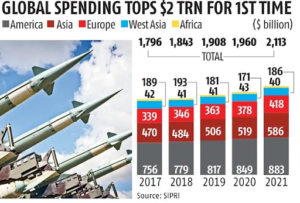In news– The Stockholm International Peace Research Institute (SIPRI) has released the data on global military expenditure recently.
Key higlights of the report-
- World military spending continued to grow in 2021, reaching an all-time high of $2.1 trillion despite the economic fallout of the pandemic.
- There was a slowdown in the rate of real-terms growth due to inflation. In nominal terms, however, military spending grew by 6.1%.’
- As a result of a sharp economic recovery in 2021, the world military expenditure as a share of the world gross domestic product (GDP), fell by 0.1 percentage points, from 2.3% in 2020 to 2.2% in 2021.
- According to data published by SIPRI, the top five military spenders—the United States, China, India, the United Kingdom, and Russia—accounted for 62 per cent of the global military expenditure.
- The report noted that China’s military expenditure has grown for the 27th consecutive year.
- Similarly, Russia also saw an increase in its military expenditure for the third consecutive year.
- Stating that military spending in Asia and Oceania totalled $586 billion in 2021.
- The increase in 2021 was due primarily to growth in Chinese and Indian military spending. Together, the two countries accounted for 63% of total military expenditure in the region in 2021.

India’s military expenditure-
- India was the third-highest military spender in the world behind the US, amounting to $76.6 billion in 2021, grew by 0.9 per cent from 2020 and by 33 per cent from 2012.
- It also says that in a drive to strengthen the indigenous arms industry, 64% of capital outlays in the 2021 Indian military budget were earmarked for acquisitions of domestically produced arm
About Stockholm International Peace Research Institute (SIPRI)-
- Established in 1966, SIPRI provides data, analysis and recommendations, based on open sources, to policymakers, researchers, media and the interested public.
- Based in Stockholm, Sweden, SIPRI is regularly ranked among the most respected think tanks worldwide.
- SIPRI’s organizational purpose is to conduct scientific research in issues on conflict and cooperation of importance for international peace and security, with the goal of contributing to an understanding for the conditions for a peaceful solution of international conflicts and sustainable peace.
















